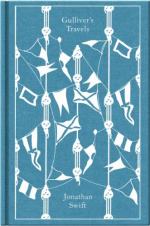When I came to my own house, for which I was forced to inquire, one of the servants opened the door, I bent down to go in (like a goose under a gate), for fear of striking my head. My wife ran out to embrace me, but I stooped lower than her knees, thinking she could otherwise never be able to reach my mouth. My daughter kneeled to ask my blessing, but I could not see her till she arose, having been so long used to stand with my head and eyes erect to above sixty feet; and then I went to take her up with one hand by the waist. I looked down upon the servants, and one or two friends who were in the house, as if they had been pygmies, and I a giant. I told my wife she had been too thrifty, for I found she had starved herself and her daughter to nothing. In short, I behaved myself so unaccountably, that they were all of the captain’s opinion when he first saw me, and concluded I had lost my wits. This I mention as an instance of the great power of habit and prejudice.
In a little time, I and my family and friends came to a right understanding: but my wife protested I should never go to sea any more; although my evil destiny so ordered, that she had not power to hinder me, as the reader may know hereafter. In the meantime I here conclude the second part of my unfortunate voyages.
[Illustration]
NOTE.
Jonathan Swift was born in Dublin, Ireland, in 1667, and died in 1745. His parents were English. His father died before he was born, and his mother was supported on a slender pittance by his father’s brother. He was educated at Trinity College, Dublin, and all through his early life was dependent on the generosity of others. His college career was not highly creditable, either from the point of view of manners, morals, or learning. After leaving college, he travelled through England on foot, and found employment with a relative of his mother’s, Sir William Temple, in whose house was a noble library; and for two years Swift made up for some of his shortcomings by studying diligently therein. He went to Oxford in 1692, took a degree and was ordained in 1694. He was given a parish in Ireland, which he soon resigned, returning to the home of Sir William Temple, where he remained until the death of the latter in 1699.
Temple left Swift a legacy, and confided to him the editing and publishing of his works. This task completed, Swift went again to Ireland to another parish, and threw himself into political pamphleteering with great effect, one of the results of his exertions being the securing of freedom from taxation for the Irish clergy. He subsequently became Dean of St. Patrick’s in Dublin, and for a period achieved great popularity owing to his powerful political writings.




